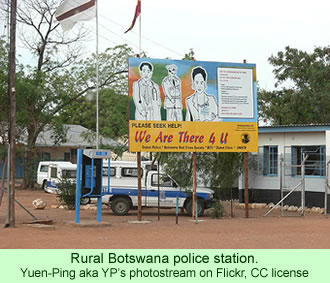Alarming news about the brutal ways Botswana has been treating the G/wi and the other San peoples of the Kalahari sometimes seems to never end. One story last week indicated that government repressions have increased, but another report was much more positive.
 The good news first. The positive report was that the Botswana Police Service has begun training San people for work as police officers. Boeletswe Gobotswang, Assistant Police commissioner and Deputy Director of the Botswana Police College, confirmed the report.
The good news first. The positive report was that the Botswana Police Service has begun training San people for work as police officers. Boeletswe Gobotswang, Assistant Police commissioner and Deputy Director of the Botswana Police College, confirmed the report.
He indicated that the Police Commissioner directed the college to begin recruiting people from the San communities for training. Initially, the agency intended to recruit 30 San for inclusion among the 160 new officers selected for 12 months of training. However, due to competition for the positions, only eight finally qualified.
The Commissioner stated that including the San people as trained officers will help end “miscommunication” during police investigations. He also said that including them in the police force will help break down barriers between government agencies and the San communities.
The second, more negative, news story gave further details about the government’s decision to prevent the San people living in the Central Kalahari Game Reserve (CKGR) from gathering food in the desert, as they have been doing for millennia.
According to Survival International, a human rights NGO based in London, three children were jailed the week before last for possessing antelope meat. The government has outlawed hunting in the CKGR. The children were released subsequently, but SI has learned that other incidents of intimidation and harassment have also occurred in recent weeks.
Amogelang Segootsane was beaten up by wildlife officials on January 9th because he had wild fruits and berries in his possession. They told him that the wild foods were “for animals, not human[s].” He was hospitalized as a result.
Another San man told SI that they were being harassed and hunted by the Botswana police because of tourism. The police especially hound the indigenous people if they suspect they have been gathering wild foods, he alleged. “The Bushmen of the CKGR cannot eat, cannot drink. How will they survive without food?” he asked rhetorically.
Stephen Corry, Director of SI, noted on January 15th that the government of Botswana has used the values of conservation and protection of wildlife as an excuse for its latest abuses of the San societies. And, he indicated, Ian Khama, the president of Botswana, is on the board of Conservation International, an American NGO that is well known for advocating the protection of the natural environment worldwide. “The American NGO obviously knows its board member’s atrocious human rights record,” Corry said.
The government’s first major effort to destroy the G/wi society, starting more than a decade ago, was to forcibly remove them from their homes in the CKGR. They were relocated into deplorable resettlement communities. They finally won a suit in the nation’s High Court in 2006 which guaranteed them both the right to return to the desert and the right to resume their pre-exile mode of subsistence.
The government then tried to prevent them from having access to water in their desert communities. After some years of legal wrangling, Botswana’s Court of Appeals in 2011 ruled that the government was completely wrong and ordered it to allow the G/wi, and the other San people, to drill wells for water at their own expense.
Their latest repressive measure, announced in November, has been to deny them the right to hunt and gather food. If it can’t force them out, or prevent them from having drinking water, it can at least starve them into submission—under the guise of conservation, of course.
It is not clear why the government persists in its hostility to the San peoples. It appeared in the earlier years of the seemingly endless court battles as if the major issue was one of control of diamond wealth. For reasons that are not completely clear, it now seems as if government officials feel the San may somehow interfere with tourism. The motives, the reasoning, are obscure.